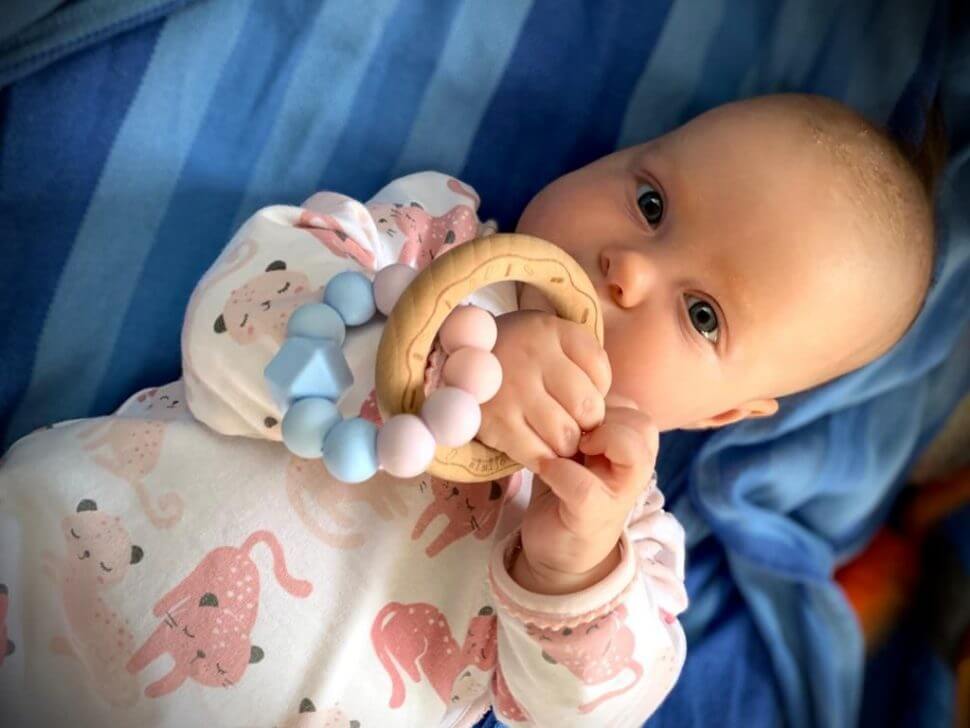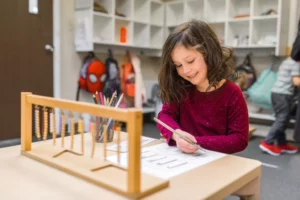It is not about having your children be the first to walk. We are instilling in the baby a sense of competence, confidence, and excitement to constantly explore, learn, and grow. Building a relationship with your child is vital. Let’s learn more about Montessori from Birth to establish a respectful relationship.
Building a relationship is important
Montessori education extends beyond a method of instruction to an understanding of how to promote natural development. Maria Montessori’s philosophy and developmental theories help us understand:
- What each child’s inner guide or developmental path is through kindness and respect, and
- The practice and implementation help us follow each child’s inner guide or developmental path through kindness and respect.
In Montessori theory, symbiotic life is the first 6 to 8 weeks of a baby’s life, also known as post-partum or the fourth trimester. At this stage of life, a mother and her child require each other and form a symbiotic relationship. A mother has recently lost a portion of her body that she had been carrying for the past 9 months.
A baby has just left the warm and familiar confines of its mother’s womb. Being together in these first weeks is critical for both mother and child’s physical and psychological well-being.
The world outside the womb is so different that the baby must begin breathing immediately and their digestive system must begin working to pass meconium (a dark tar-like bowel moment that passes what was in the baby’s intestines in the womb). The best way to help both of these is to engage in skin-to-skin contact right after birth. Skin-to-skin contact gives the baby important points of reference, which reduces stress.
For example, while lying on their mother’s chest, they can hear their mother’s heartbeat, hear her voice, and her nipples release a fluid that smells like amniotic fluid. Babies will smell it and wiggle over to the breast.
Babies are very dependent but not helpless, and we always treat all life with respect in Montessori practice. A baby’s perceptive mind will learn how to form an intimate bond and relationship through interactions with their mother. How you hold, handle, and feed them will set the tone for all future relationships. How can we build a mutually respectful relationship?
Respect their body:
When babies nurse, their reflexes cause them to pull the nipple back to their soft pallet, where they can get the most milk. Simply place the baby’s lips against your nipple. It’s fine if they play for a brief moment. Consider how you’d like someone to feed you. How you feed your child teaches them how others should respect their body.

Continue to wear the baby skin to skin as much as possible, but if clothing is required, choose comfortable, easy-to-wear clothing that can be put on with the minimal movement of the baby’s body. Rompers with buttons or snaps down the front are ideal. Avoid wearing outfits that cover your entire head.
Breastfeeding on demand:
A mother’s breast produces colostrum in the first few days after her baby is born. During this time, skin-to-skin contact and frequent feedings aid in the establishment of a good milk supply. The milk will change after a few days, as will the baby’s eating habits.
Instead of sticking to a schedule, learn to read hunger cues. A tight fist may indicate that they are hungry, and the fist will relax as they eat. Sticking out their tongues or having a rooting reflex (opening their mouth as if looking for a breast) are other signs that they are hungry.
Listening to their cries and observing their body language
Babies cry for diaper changes because they are tired and want to be held and loved. By understanding what their cry means, you will be able to better meet their needs and deepen your relationship.
Freedom of Movement
In this new open-world, babies need to be able to stretch, move, and explore their bodies.

Allow the baby to use their bare hands to touch their face and body. These feelings will be remembered by the baby, even while still in the womb.
Support
The most important thing is to develop a relationship with your baby. Surround yourself with family and friends to help you with housework, cook for you, and take care of you so that you can care for and bond with your baby.
If you are having difficulty breastfeeding, seek the assistance of an IBCLC (Internationally Board Certified Lactation Consultant). Breastfeeding can be difficult at times, and an IBCLC can assist with a good latch, holding, tongue ties, low or high milk supply, and other issues.
All in all:
Montessori from birth becomes less of an “add-on” and more of an intrinsic way of life when you follow everything. It combines our adoration and love for our children with a deep respect for and understanding of who they are as individuals. It allows us, as new parents, to continue learning while giving our children the freedom to discover for themselves.
The developmental goal of this symbiotic relationship between mother and baby is to establish basic trust. When the baby’s needs are met in a loving and timely manner, trust is built. When a baby’s needs are met, they learn that the world is a safe place and begins to feel secure. This sense of security lays a loving foundation that leads to a confident and optimistic baby, child, and adult as the child begins to build their personality through their experiences. When it comes to raising a Montessori baby, opting for Montessori school is the best option.










